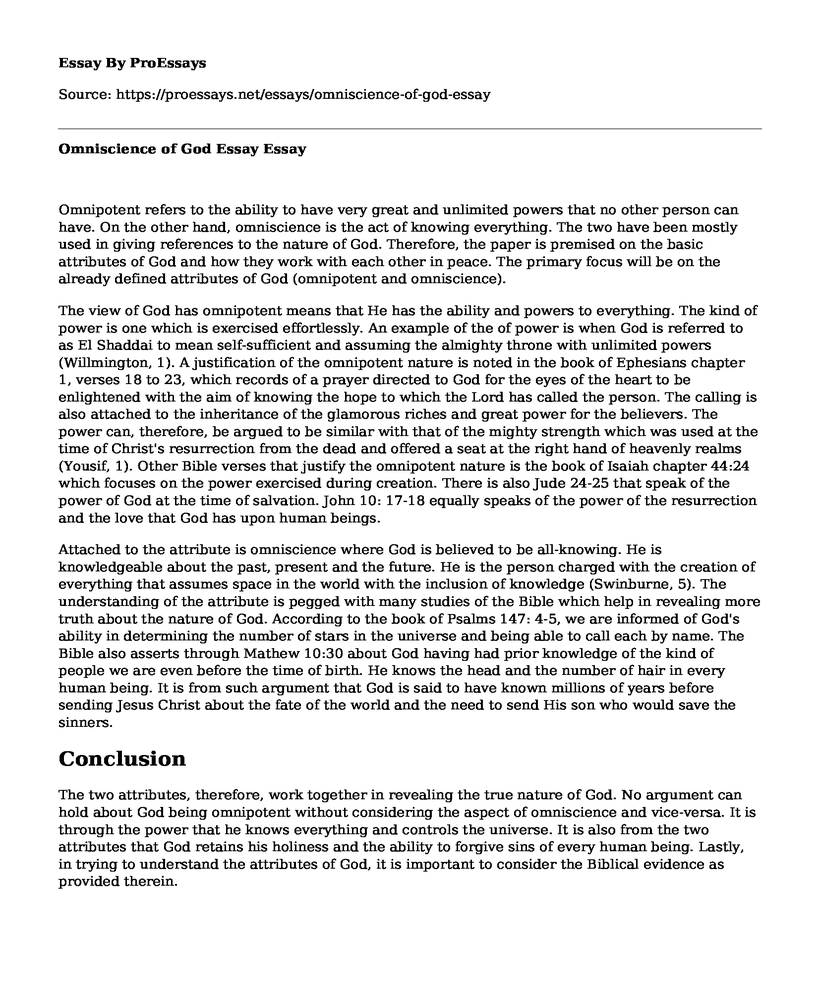Omnipotent refers to the ability to have very great and unlimited powers that no other person can have. On the other hand, omniscience is the act of knowing everything. The two have been mostly used in giving references to the nature of God. Therefore, the paper is premised on the basic attributes of God and how they work with each other in peace. The primary focus will be on the already defined attributes of God (omnipotent and omniscience).
The view of God has omnipotent means that He has the ability and powers to everything. The kind of power is one which is exercised effortlessly. An example of the of power is when God is referred to as El Shaddai to mean self-sufficient and assuming the almighty throne with unlimited powers (Willmington, 1). A justification of the omnipotent nature is noted in the book of Ephesians chapter 1, verses 18 to 23, which records of a prayer directed to God for the eyes of the heart to be enlightened with the aim of knowing the hope to which the Lord has called the person. The calling is also attached to the inheritance of the glamorous riches and great power for the believers. The power can, therefore, be argued to be similar with that of the mighty strength which was used at the time of Christ's resurrection from the dead and offered a seat at the right hand of heavenly realms (Yousif, 1). Other Bible verses that justify the omnipotent nature is the book of Isaiah chapter 44:24 which focuses on the power exercised during creation. There is also Jude 24-25 that speak of the power of God at the time of salvation. John 10: 17-18 equally speaks of the power of the resurrection and the love that God has upon human beings.
Attached to the attribute is omniscience where God is believed to be all-knowing. He is knowledgeable about the past, present and the future. He is the person charged with the creation of everything that assumes space in the world with the inclusion of knowledge (Swinburne, 5). The understanding of the attribute is pegged with many studies of the Bible which help in revealing more truth about the nature of God. According to the book of Psalms 147: 4-5, we are informed of God's ability in determining the number of stars in the universe and being able to call each by name. The Bible also asserts through Mathew 10:30 about God having had prior knowledge of the kind of people we are even before the time of birth. He knows the head and the number of hair in every human being. It is from such argument that God is said to have known millions of years before sending Jesus Christ about the fate of the world and the need to send His son who would save the sinners.
Conclusion
The two attributes, therefore, work together in revealing the true nature of God. No argument can hold about God being omnipotent without considering the aspect of omniscience and vice-versa. It is through the power that he knows everything and controls the universe. It is also from the two attributes that God retains his holiness and the ability to forgive sins of every human being. Lastly, in trying to understand the attributes of God, it is important to consider the Biblical evidence as provided therein.
Works Cited
Willmington, Harold. "God is Omnipotent." (2017).
Swinburne, Richard. "Why Believe That There Is a God." Religious Inquiries 5.10 (2016): 5-18.
Yousif, Alex. "Abductive Reasoning and an Omnipotent God: A Response to Daniel Came." (2017).
Cite this page
Omniscience of God Essay. (2022, May 06). Retrieved from https://proessays.net/essays/omniscience-of-god-essay
If you are the original author of this essay and no longer wish to have it published on the ProEssays website, please click below to request its removal:
- Sin and the Effects of Sin Paper Example
- Christianity Role in Independence of Slaves Essay Example
- Essay Sample on Ontology & Epistemology in Philosophy
- Essay Example on Hinduism: World's Oldest Religion, Free From Fanaticism
- Hinduism: Ancient Religion of India & Asia's Eternal Way - Essay Sample
- Essay Sample on Buddhism: Chanting, Rituals, and Liturgy
- Essay Example on Buddhism: A Religion of Unity, Not Difference







